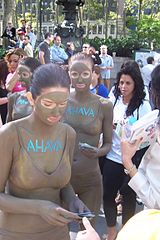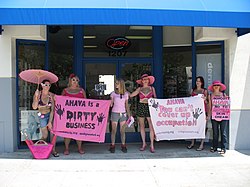Ahava: Difference between revisions
Floccinauci (talk | contribs) Replace text to disambiguate - West Bank in other locations so not redundant. |
Floccinauci (talk | contribs) Delete England from list of flagship stores as that outlet closed today |
||
| Line 13: | Line 13: | ||
}} |
}} |
||
[[File:Ahava factory.JPG|thumb|210px|Ahava factory]] |
[[File:Ahava factory.JPG|thumb|210px|Ahava factory]] |
||
'''Ahava''' ({{lang-he|אהבה}}, ''Love'') is an [[Israel]]i cosmetics company that manufactures [[skin care]] products made of mud and mineral-based compounds from the [[Dead Sea]]. The company's administrative headquarters are located in [[Holon]] but the main manufacturing plant and showroom are in [[Mitzpe Shalem]],<ref group="a">[http://maps.google.com.au/maps?f=q&source=s_q&hl=en&geocode=&q=Mitzpe+Shalem+Israel&aq=&sll=31.633506,35.425415&sspn=0.665296,1.359558&ie=UTF8&hq=&hnear=Mitspe+Shalem,+Israel&ll=31.644029,35.403442&spn=0.66522,1.359558&z=10 See map]</ref> an [[Israeli settlement]] located on the Dead Sea in the [[West Bank]] of the [[Palestinian Territories]].<ref>{{cite news|url= http://news.bbc.co.uk/2/hi/7708244.stm |title= Concern over Israel settlement exports |publisher=BBC News |date=2008-11-05 |accessdate=2011-05-09}}</ref> The company has flagship stores in Israel, Germany |
'''Ahava''' ({{lang-he|אהבה}}, ''Love'') is an [[Israel]]i cosmetics company that manufactures [[skin care]] products made of mud and mineral-based compounds from the [[Dead Sea]]. The company's administrative headquarters are located in [[Holon]] but the main manufacturing plant and showroom are in [[Mitzpe Shalem]],<ref group="a">[http://maps.google.com.au/maps?f=q&source=s_q&hl=en&geocode=&q=Mitzpe+Shalem+Israel&aq=&sll=31.633506,35.425415&sspn=0.665296,1.359558&ie=UTF8&hq=&hnear=Mitspe+Shalem,+Israel&ll=31.644029,35.403442&spn=0.66522,1.359558&z=10 See map]</ref> an [[Israeli settlement]] located on the Dead Sea in the [[West Bank]] of the [[Palestinian Territories]].<ref>{{cite news|url= http://news.bbc.co.uk/2/hi/7708244.stm |title= Concern over Israel settlement exports |publisher=BBC News |date=2008-11-05 |accessdate=2011-05-09}}</ref> The company has flagship stores in Israel, Germany, Hungary, the Philippines and Singapore.<ref>[http://www.cosmeticsbusiness.com/technical/article_page/Israel_-_Mineral_Magic/49839 Mineral Magic]</ref> {{As of|2010}}, Ahava income is more than US$150 million a year.<ref name="jordan"/> |
||
==History== |
==History== |
||
Revision as of 13:19, 20 September 2011
 | |
| Company type | Private |
|---|---|
| Industry | Cosmetics |
| Founded | 1988 |
| Headquarters | Holon, Israel |
| Products | Skin care |
| Revenue | $150 million |
Number of employees | 200 |
| Website | http://www.ahava.com/ |

Ahava (Hebrew: אהבה, Love) is an Israeli cosmetics company that manufactures skin care products made of mud and mineral-based compounds from the Dead Sea. The company's administrative headquarters are located in Holon but the main manufacturing plant and showroom are in Mitzpe Shalem,[a 1] an Israeli settlement located on the Dead Sea in the West Bank of the Palestinian Territories.[1] The company has flagship stores in Israel, Germany, Hungary, the Philippines and Singapore.[2] As of 2010[update], Ahava income is more than US$150 million a year.[3]
History
Ziva Gilad, a spa technician, came up with the idea of marketing Dead Sea mud after watching women tourists scooping up the mud to take home.[4] Ahava was founded in 1988 as a single stand selling bottles of body scrub to tourists, generating $1 million that year.[5]
Ahava's shareholders include Hamashbir Holdings, Gaon Holdings, Kibbutz Ein Gedi, Kibbutz Mitzpe Shalem and Kibbutz Kalya. Kibbutz Mitzpe Shalem and Kibbutz Kalya are located north of the Green Line, in the West Bank.[6]
In 2009 Ahava took on new shareholder Shamrock Holdings, the Walt Disney Family's investment arm, which purchased 20% of Ahava Dead Sea Laboratories from its existing shareholders[7][8] The company has 200 employees, 180 of them in Israel.[8]

In 2009, the company reported sales of nearly $150 million a year. In the United States, the largest overseas market for Ahava products, the company signed distribution deals with Lord & Taylor, Nordstrom and the beauty-supply chain Ulta.[4]
Ahava is the only cosmetics company licensed by the Israeli government to mine raw materials at the Dead Sea.[4] On the Jordanian side of the Dead Sea, there are approximately fifty small companies producing cosmetics, but only 15 have a global presence. Israel has imported raw materials for its Dead Sea mud cosmetics from Jordan since 1994.[3]
In 2011, Elana Drell Szyfer, former Senior Vice President of Global Marketing for Estee Lauder, was appointed general manager of Ahava North America.[9]
Products
Ahava product lines include a basic product for all skin types; other products for dry, sensitive skin and for men’s skin; and anti-aging products for face and body.[10] Product lines include hand cream, foot cream, facial cleanser, body milk, facial nourishing cream, facial moisturizer, moisturizing shower cream and body cream.[11] Some products claim to use citrus and citrus products as a source of vitamins and minerals.[10]
Dead Sea mud, alone or in combination with other ingredients, is believed to have benefits for deep cleansing and stimulation of the skin. Minerals extracted from Dead Sea water such as calcium, magnesium and potassium, are said to improve the metabolism, stimulate circulation and aid in the natural repair of cells.[12] In 2009, Ahava Dermud range of skincare products has been shown to have protective, anti-oxidant and anti-inflammatory properties that can antagonize biological effects of UVB radiation on skin, reducing skin photodamage and photoaging, and reducing oxidative stress and inflammation in skin pathologies.[13]
Therapy with mud packs for conditions such as osteoarthritis is relatively expensive and requires the assistance of a therapist and a treatment room. In the wake of these limitations, Ahava developed mud compresses used in the home which are heated in a microwave oven or a pot of hot water and placed over painful joints. A clinical research by the Ben Gurion University of the Negev, supported in part by a grant from “Ahava”, has concluded that the group treated with natural mud compresses had a reduction of 20% or more in Knee Osteoarthritis pain scores at treatment completion, at one month, and at three months, compared to the control group.[14]
Embracing the trend toward more natural ingredients in cosmetics, Ahava purifies its own water and, according to the company, employs minimally invasive techniques to harvest mud and minerals. Ingredients are not tested on animals and Ahava products are packaged in recyclable containers.[4]
Scientific research
Ahava is one of several Israeli cosmetics companies researching nanotechnology applications. The company has established an R&D program to research nanoemulsion and nanosuspension with mud nanoparticles.[12]
Ahava operates its own laboratory for cell and organ culture. It is the coordinator of SkinTreat (FP-7) and a partner in nanoReTox (FP-7) founded by Cellage, a European research consortium the specializes in skin cellular Ageing (FP-5).[15] Ahava developed a laboratory model for in-vitro NP screening that is employed for studying inflammatory processes using UV- irradiated human skin organ cultures.[15]
Controversy
According to human rights organization B'Tselem, several Israeli commercial ventures in the West Bank, including Ahava, breach the Hague Convention on the Law and Customs of War on Land, which prohibits exploitation of resources in occupied territory.[16]

Boycott campaigns have been organized by organizations such as Code Pink, which says that Ahava's products come from "stolen Palestinian natural resources in the occupied territory of the Palestinian West Bank", and are produced in Mitzpe Shalem.[17] In response, the company stated that the Mitzpe Shalem kibbutz where the products are produced is not an illegal settlement, and that the mud and materials used in Ahava cosmetics products are mined in the Israeli part of the Dead Sea.[18]
As part of an economic agreement between Israel and the European Union, Israel must label products made in the West Bank, which are subject to higher tariffs.[19] In November 2009, Dutch MP Van Bommel (Socialist Party) asked Dutch FM Verhagen (CDA) whether or not Ahava products that were marketed at the time in The Netherlands, originated from the Palestinian Territories. If so, Ahava would not be entitled to a tax-exemption at Dutch customs.[20] Verhagen promised to launch an investigation through the Dutch customs authority.[21] In February 2010, the state-secretary of Economic Affairs Heemskerk responded to Van Bommel through a letter to the Dutch Parliament, saying that after checking for the years 2007-2009 the Dutch customs did not give tax-exemption to Ahava products.[20]
Due to ongoing protests, which have led to complaints by adjacent businesses, landlords of the London store have not renewed the lease of Ahava's Covent Garden store in London.[22] Activists who locked themselves to a cement-filled barrel inside the entrance to this shop were arrested and convicted on charges of aggravated trespassing.[23][24]
South African activists have submitted an affidavit to the South African Police Service accusing retailer, Wellness Warehouse, and local Ahava importer, SDV Pharmaceuticals, of violating South African trade law for selling Ahava products carrying false labels of origin.[25]
See also
Notes
References
- ^ "Concern over Israel settlement exports". BBC News. 2008-11-05. Retrieved 2011-05-09.
- ^ Mineral Magic
- ^ a b "Jordan eyeing big share of Dead Sea cosmetics market". The Taipei Times. 2010-03-21. Retrieved 2011-05-01.
- ^ a b c d Ahava turns Dead Sea Mud into Money
- ^ Export Now: Five Keys to Entering New Markets, By Frank Lavin, Peter Cohan.
- ^ "Mitzepe Shalem – Google Maps". Google Maps. 2011-08-07. Retrieved 2011-05-01.
- ^ Neuman, Efrat. "Will the British buy love from the Dead Sea?". Haaretz. Retrieved 2011-02-19.
- ^ a b From Israel with Ahava, Haaretz
- ^ Ahava Rejuvenates Brand Image
- ^ a b AHAVA skincare products mine the Dead Sea for efficacy, product review
- ^ Greer Fay Cashman (January 3, 2008). "MarketWise". The Jerusalem Post.
- ^ a b "Israel — Mineral Magic". HPCi Media Limited. 2010-03-01. Retrieved 2011-05-01.
- ^ Portugal-Cohen, M., Soroka, Y., Ma’or, Z., Oron, M., Zioni, T., Brégégère, F. M., Neuman, R., Kohen, R. and Milner, Y. (2009), Protective effects of a cream containing Dead Sea minerals against UVB-induced stress in human skin. Experimental Dermatology, 18: 781–788. doi: 10.1111/j.1600-0625.2009.00865.x
- ^ Therapy With Mud Compresses for Knee Osteoarthritis: Comparison of Natural Mud Preparations With Mineral-Depleted Mud. Flusser, Daniel; Abu-Shakra, Mahmoud; Friger, Michael; Codish, Shlomi; Sukenik, Shaul. Journal of Clinical Rheumatology. August 2002 - Volume 8 - Issue 4 - pp 197-203
- ^ a b Nanother: Ahava
- ^ "Dispossession and Exploitation: Israel's Policy in the Jordan Valley & Northern Dead Sea" (PDF). B'Tselem. May, 2011.
{{cite web}}: Check date values in:|date=(help) - ^ "Code Pink protest calls for Ahava boycott". Ynet News. July 30, 2009. Retrieved 2011-02-19.
- ^ "Pro-Israel shoppers defy Ahava products boycott call". The Jerusalem Post. July 25, 2010.
- ^ EU: Goods made at Jewish settlements are not Israeli (BBC, Feb. 26, 2010)
- ^ a b nr. 318 BRIEF VAN DE STAATSSECRETARIS VAN ECONOMISCHE ZAKEN
- ^ Verhagen gelast onderzoek naar Israëlische cosmetica
- ^ Palestine diplomatic mission [dead link]
- ^ Pro-Palestinian activists blockade Ahava store in London
- ^ Ahava four convicted of trespass | The Jewish Chronicle
- ^ Lobbyists challenge ‘made in Israel’ moniker
